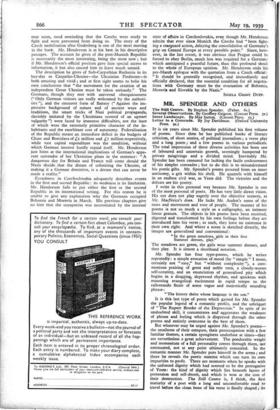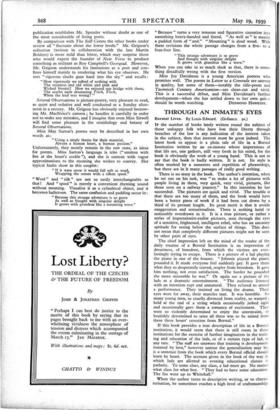MR. SPENDER AND OTHERS
The Still Centre. By Stephen Spender. (Faber. 6s.)
Letter to a Comrade. By Joy Davidman. (Oxford University Press. 98.) IT is six years since Mr. Spender published his first volume of poems. Since then he has published books of literary criticism, of short stories, of political journalism ; a verse play and a long poem ; and a few poems in various periodicals. The total impression of these diverse activities has been one of laboured and uncertain growth, seemingly hampered by
private misgivings and a divided mind. Inevitably Mr. Spender has been censured for lacking the facile cocksureness of his simpler comrades ; but to do thii is to misunderstand his poetic gifts. Mr. Spender's poems proceed from an inner antinomy, a grit within his shell. He quarrels with himself in an endless civil war, as Yeats did. The victories and the defeats are his poetry.
I write in this personal way because Mr. Spender is one of the most personal of poets. He has very little direct vision. His eye does not play eagerly over the objective scenery, as Mr. MacNeice's does. He lacks Mr. Auden's sense of the mass and movement and tone of people. The manner of his poems is not so much a style as a calligraphy, an intimate linear gesture. The objects in his poems have been received, digested and transformed by his own feelings before they are introduced into his verse ; as such, they have no existence in their own right. And where a scene is sketched directly, the images are generalised and conventional :
"In the green meadows, girls in their first Summer dresses, play."
The meadows are green, the girls wear summer dresses, and they play. It is almost a shorthand notation.
Mr. Spender has four type-poems, which he writes repeatedly : a simple evocation of mood (by " simple " I mean, certainly not "easy," but "without complexity "), a cere- monious praising of great and noble men, a closely-woven self-scrutiny, and an enunciation of generalised pity which begins in a dragging, depressed rhythm, and quickens with mounting evangelical excitement in rapid tempo to the rallentando finale of some vague and majestically sounding phrase:
"The history theirs whose language is the sun."
It is this last type of poem which gained for Mr. Spender the popular legend of a romantic profile, and the sobriquet
of "The Rupert Brooke of the Depression." In spite of its undoubted skill, it concentrates and aggravates the weakness of phrase and feeling which is dispersed through the other poems and entirely overcome in the best of them.
But whatever may be urged against Mr. Spender's poems— the smallness of their compass, their preoccupation with a few familiar themes, a certain sponginess underfoot at times—they are nevertheless a great achievement. The ponderable weight and momentum of a full personality comes through them, not extenuated, not at any point ultimately concealed. In the romantic manner Mr. Spender puts himself in the arena ; and there he reveals the poetic stamina which can turn its own impurities to profit. There are moments when he speaks with the unforced dignity which had seemed to be the prerogative of Yeats: the kind of dignity which lies beneath layers of pretension and self-deceit, and which is won at the cost of their destruction. The Still Centre is, I think, the first maturity of a poet with a long and uncomfortable road to travel before the clean bone of his verse is finally shaped ; its
publication establishes Mr. Spender without doubt as one of the most considerable of living poets.
By comparison with The Still Centre the other books under review all "fluctuate about the lower levels." Mr. Grigson's collection (written in collaboration with the late Martin Boldero) is more mild than bitter, which may surprise those who would expect the founder of New Verse to produce something as militant as Roy Campbell's Georgiad. However, Mr. Grigson understands his limitations as a poet and con- fines himself mainly to rendering what his eye observes. He sees "vigorous clocks gaze hard into the sky" and recalls :
"How vigorously we talked of nothing with The countess and old white and pink and Wicked Strozzi 1 How we enjoyed our bridge with them,
The scarlet nails drumming Tisch, Tisch,
When the lead was wrong! "
Several Observations is picture-poetry, very pleasant to read, as .quiet and sedative and well conducted as a Sunday after- noon in a rectory. Mr. Grigson has obviously enjoyed borrow- ing Mr. MacNeice's camera ; he handles it carefully in order not to make any mistakes, and I imagine that even Miss Sitwell will find some pleasure in the ornithology and botany of Several Observations.
Miss May Sarton's poems may be described in her own words as: "Using a single theme for their material, Always a human heart, a human passion."
Unfortunately, they mostly remain in the raw state, as ideas for poems. Miss Sarton's language is trite (" smitten with fire at the heart's cockle "), and she is content with vague approximations to the meaning she wishes to convey. Her typical faults show in this couplet: " Jf it were snow it would fall soft as wool, Wrapping the senses with a silken spool."
" Wool " and " silk " are not so easily interchangeable as that! And " spool " is merely a convenient rhyming sound without meaning. Visualise it as a cylindrical object, and it becomes ludicrous. The same confusion and padding occur in :
"Because this strange adventure is so grave As well as fraught with singular delight
It grows with grandeur like a mounting wave." " Because " turns a very tenuous and figurative causation into something heavy-handed and literal. "As well as" is merely a padded form of "and." "Mounting" is dead wood. With these revisions the whole passage changes from a five- to a four-foot line.
"This strange adventure is so grave
And fraught with singular delight It grows with grandeur like a wave."
When you can take in as much slack as that, there is some- thing dreadfully wrong with the first version.
Miss Joy Davidman is a young American poetess who promises well. The poems in Letter to a Comrade are uneven in quality, but some of them—notably the title-poem and Twentieth Century Americanism—are clean-cut and vivid. This is a successful debut, and Miss Davidman's further development—when she has settled down to her own gait—



















































 Previous page
Previous page